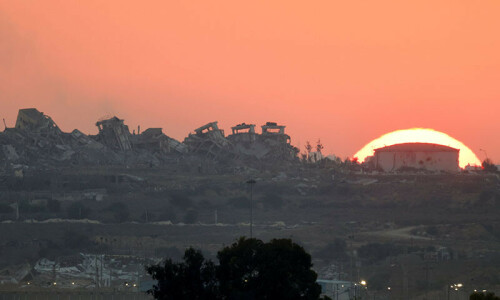ASHGABAT: The leaders of Pakistan and Afghanistan are expected to approve an ambitious gas pipeline when they meet in Turkmenistan on Saturday, lending support to a US-backed project to pump gas across Afghanistan's war zone.
India's petroleum and natural gas minister is also scheduled to sign up to the TAPI project, with the aim of constructing a pipeline that would snake 1,700 km (1,060 miles) from Turkmen gas fields to the fast-growing markets of Pakistan and India.
Turkmenistan, a former Soviet republic on top of the world's fourth-largest natural gas reserves, plans to triple gas output to 230 billion cubic metres (bcm) over the next 20 years. With a population of only 5 million, it will export nearly 80 percent.
Turkmenistan traditionally sends its gas north to Soviet-era master Russia but is becoming an increasingly important supplier to China, Iran and Europe. India and Pakistan, via the TAPI pipeline, would also offer potentially large new export markets.
The United States has expressed its support for the project.
Susan Elliott, deputy assistant secretary of state for South and Central Asian affairs, told an energy conference in Ashgabat last month that the pipeline would create jobs in Afghanistan.
She said it was “a good example of how Turkmenistan's resources could benefit other countries in the region.”
However, building the pipeline through some of Afghanistan's most volatile regions presents a major challenge. The proposed route runs from western Herat, near the Iranian border, through the southern Taliban heartlands of Helmand and Kandahar.
The central government has only a tenuous grip on much of this territory, despite the presence of tens of thousands of foreign troops meant to bolster security.
Parts of the 735 km Afghan stretch will be buried underground as a precaution against attacks, and local communities will be paid to guard it, Afghan Mines Minister Wahidullah Shahrani said in September.
SECURITY, FINANCE
Security is likely to be discussed when Turkmen President Kurbanguly Berdymukhamedov hosts his Afghan counterpart, Hamid Karzai, as well as Pakistani President Asif Ali Zardari and Indian Petroleum and Natural Gas Minister Murli Deora.
“Central to the agreement is the issue of security, with Turkmenistan apparently not liable for any shortfall or disruption in supply, which would infer that the onus is on each of the transit states to secure the pipeline,” Gerry Hennigan, analyst at Goodbody Stockbrokers, wrote in a note.
Financing will also be key. Turkmenistan has previously estimated the cost of the project at $3.3 billion, although various estimates have costs running as high as $10 billion. The project is backed by the Manila-based Asian Development Bank.
The four countries involved in the TAPI project signed the framework of an agreement in September, which they expect to ratify in Ashgabat. They are also expected to sign an agreement on sales volumes.
Turkmenistan expects the pipeline, which will run from the Dovletabad field but may later incorporate gas from the massive South Iolotan deposit now under development, to have initial annual capacity of 33 billion cubic metres.
India and Pakistan have expressed interest in buying up to 70 bcm annually, and the pipeline's capacity could be expanded. – Reuters















































Dear visitor, the comments section is undergoing an overhaul and will return soon.